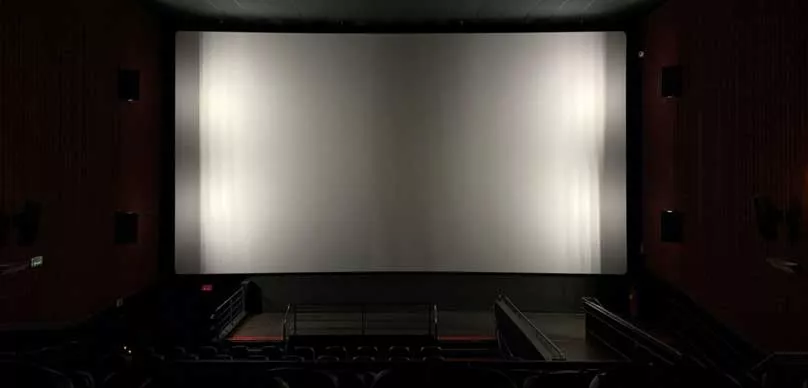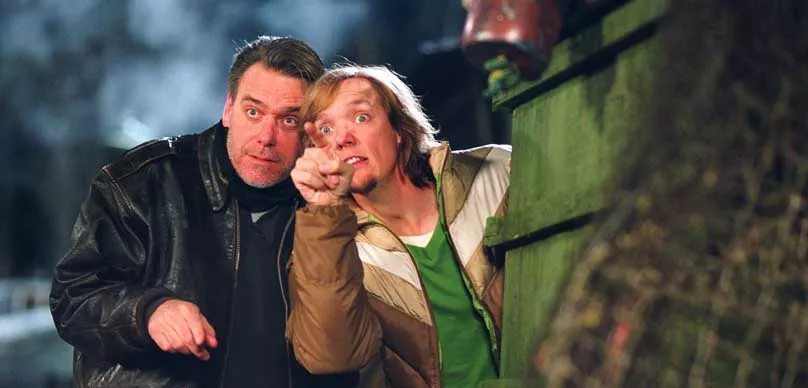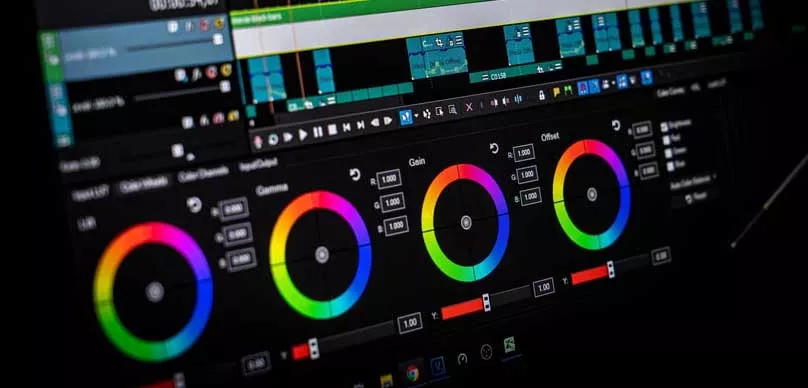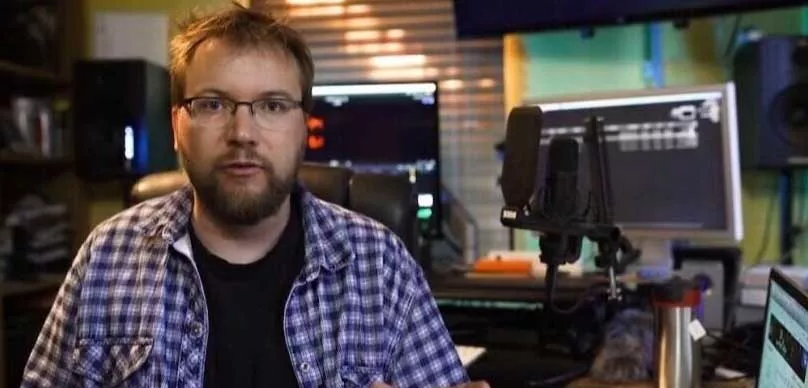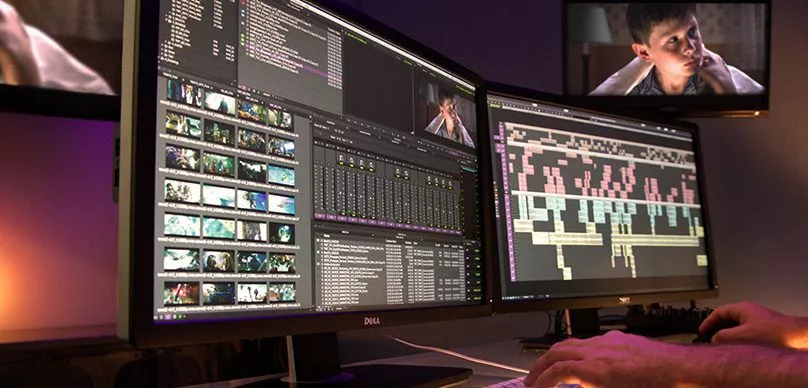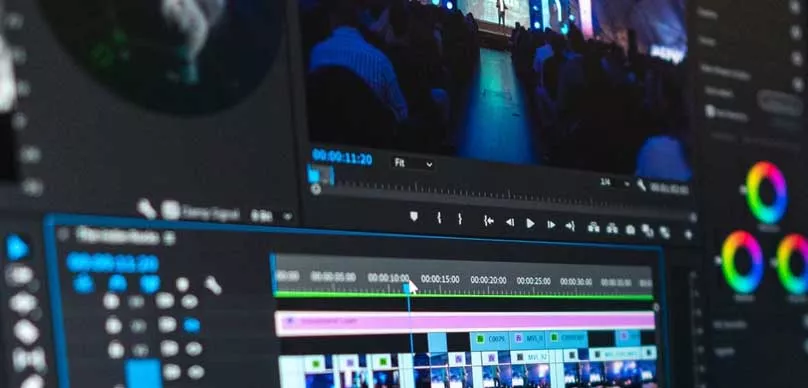Over the years I’ve seen many of my fellow indie filmmakers get completely ripped off when they entered the post-production process. So many promises are given and the rates they charge are criminal. I wanted to put together a podcast to pull the curtain back on the “true” pricing of post-production services.
Now, this is based on my experience working in Los Angeles so the prices might differ depending on where you are in the country or the world.
I hope this episode provides a great amount of value and that it saves you your hard-earned cash while making your next indie film. Enjoy!
Right-click here to download the MP3
Alex Ferrari 0:00
So guys, today's episode is really dear to my heart because it has to do with post production where I've been making my bones for the last 20 odd years editing, feature films and all the other stuff that I do. And one thing I've noticed over the years is how much filmmakers get absolutely ripped off in post production, because they don't have basic knowledge of what things cost, and what to look for when hiring post production personnel. So first and foremost, I want to talk about the big post houses now. Before I start guys, and I know I'm going to get a lot of heat over these numbers, I'm going to get a lot of questions or comments about like, Oh, I can get this thing cheaper here, I can get this thing there. But that's great. And I wish you the best this is these are the numbers and the prices from my experience here in Los Angeles. Currently in 2016. This is what the prices are going for right now. And they're a good barometer doesn't mean that they're the end all and the end all be all that that this is Bible, this is gospel, this is what everything has to cost. No, it is my experience. And what I've seen in my time in the post production trenches. So with that said, let's start talking about big post houses. Now, I've worked for some big post houses in my day, mostly as a freelancer, thank God. But big post houses have a lot of overhead. And I'm going to tell you a little story about what how post houses came to be. Back in the day, when post houses were the only places you can go get post production done for feature films, or commercials or music videos or anything. They charged up the wazoo because they could and they had to because all the equipment, you know, before a color grading suite in. I remember these color grading suites, these were million dollar color grading suites, I mean literally million million and a half dollars worth of equipment in those rooms. So you had to charge $750 an hour just to start recouping their money eventually. But as technology got cheaper, these post production suite started showing up in people's houses like color suites and editing. Now everybody could edit on a laptop, to edit a feature film, you don't have to go to an avid somewhere in a facility that used to cost $200,000 just to edit your movie, you can do that now in the comfort of your own home, things started changing. Now a lot of the mindsets in post production houses didn't change. So they would still try to charge you to like plug in a hard drive. You know, like I remember I took a client to a post house. And I had to plug in a hard drive and I'm like, Oh, that's gonna be 50 bucks. I'm like, What? to plug it in and download something. Are you kidding me. But this is the mindset of post houses a lot of times, especially at the higher end post houses. So I'm I'm talking about independent film, independent filmmakers. I've also worked a lot in commercials, and that's a whole other world. But independent filmmakers. You know, post houses don't make a whole lot of sense. Big post houses don't make a whole lot of sense. And I'll talk about boutiques in a second. But I'm talking about these big monster post houses that everybody knows about in your specific town. So these guys are in a lot of ways rip offs. Now with that said there are deals to be made up the supposed houses, sometimes the post houses are hungry, and they're willing to drop their prices down. Believe it or not, I've had to compete against multimillion dollar post houses on bids for four movies that I'm shocked that they are competing with me one guy in a post sweet comparatively to their big facilities because you know, times were tough and they needed to go they're trying to go after that, that same client so there are deals to be made but to be very wary of them because they will charge you all a cart for so many different things that you won't even see coming. So if you are going to work with them, you have to have an upfront package deal and make sure everything's clear and there's no surprises if you're going to go down that road. But boutiques boutique post houses which are Smaller companies that have a handful of suites, these guys are good to work with, they generally will give you good deals, but packages, you're generally working with the owner of the company, or someone really close to the owner. So it's not like this big monster corporation that you're dealing with, again, package out deals for everything upfront. And don't try to get go by the hour or go by and you're gonna go nuts, and they're gonna rape you. So you know, I always like to package things out. I don't like generally going by ours, purely because it just doesn't make a lot of sense for independent filmmakers, when I bid out stuff, but that's just me. So. So where do you go if you don't go to these big post houses, or if you don't want to go to a boutique? Well, you go to independent contractors, a lot of independent contractors. Now again, I'm calling I'm talking about my perspective, here in Los Angeles, here, there's a million independent contractors, a million small little companies, a million guys in the back of their house, with full blown facilities that would rival anything in a big post house. That's here in Los Angeles, I'm sure there's like that in New York, and some other big cities as well. But here in Los Angeles, they're literally everywhere. But if you can't find someone in your town, then you might have to go to a boutique or to a big post house or ship it off here to LA or New York, or Atlanta, as well, we have a lot of facilities there as well. There's a bunch of places around the country that have a lot of depth with in post production, but New York la are still the two big guys, as far as a lot of big post production, even when companies and movies are made elsewhere in the country. post production generally always comes back to Los Angeles, as far as post production, that visual effects but just straight up post production. So with that said, Guys, independent contractor, so how much does it cost to get an editor to edit your movie, a real editor with real credits. My experience here in Los Angeles, it's around 12 $100, to anywhere from 1200 to 2500 a week, and they'll package out probably a six to eight week run of doing an assemble, cut, a polished cut, a Final Cut, and so on. So it's about a six to eight week process. Sometimes more, sometimes less, it all depends on the deal that you can cut with that editor. Generally, that editor will have his own editing system, whether that be an avid, or a premiere system. Now, even on all Final Cut system is still very feasible nowadays for editorial, especially for independent films, it's still used a lot Final Cut seven. But that's the price that generally, you're going to look for, for an editor. And when you do hire an editor, please look at their credits, make sure they've actually edited feature films, make sure they've actually delivered feature films, and not just hire someone who says hey, I've got an editing system, I can edit your movie. Now you can also edit your movie yourself, there's nothing wrong with that. I wouldn't, I would, unless you're an editor, a professional editor or has a lot of editing experience, I would let a professional editor edit your stuff, it's going to be a better scenario at the end of it. Next color grading, which is where I live a lot of in my color grading suite, color grading ranges anywhere on an hourly range from $200 an hour to $450 an hour. And it can range up all the way up to seven $800 an hour, even up to 1000 depending on the size of the post house and the suite. Now a lot of times filmmakers will get wooed by a big post house because they have a big screening room and they feel like they're you know big stuff sitting down in the in the theater. And they're color grading like all this is the way most James Cameron or Michael Bay must color grade. So this must be cool. You know, that's all wonderful man. And it's great. And if you can get a good deal on those kind of sweets, God bless Go for it. Generally those sweets are you're paying a lot for a good color is no question. But you're paying for extra stuff that you don't need. You don't need to sit in front of a theater in a theater, you can sit very comfortably in a suite with a nice 55 inch or 60 inch calibrated monitor and do wonderful work. And if you want to see a screening of it later on a big screen, you can, but that's going to be that's where I've colored. I mean the arch a bunch of theatrical films that I've done, as well as straight to DVD and VOD movies as well. So there's no real reason to be in those big suites unless you really want to, and you can afford it. But I would I would stay away from it especially in an indie film budget, no need for it other than ego and just being all look how cool I am. So just be aware of that guys. Now sound. Sound is a very mysterious thing to me. We're going to hopefully have a great sound mixer coming on the show in the next next month or two. I want to be recording the interview soon. But general pricing for a feature film independent feature film project and again And this is going to be very, it's going to vary wildly depending on the movie, it is if it's a huge action movie, if the sound has been done horribly on production, there's a lot of variables. So please use this range of money as a real rough reference. But anywhere between $15,000 to $50,000. To do a full mix, ADR Foley real Foley with like a real Foley stage, not just sound effects, sound editing, Final Mix five, one, the whole ball of wax with deliverables, anywhere between 15 to $50,000, is probably a decent range in the independent film world, it could obviously go higher than that. And that's one thing that you actually really do need to go to house, a post house for post production, post production sound is something that's extremely difficult to do in the back of someone house not you can Don't get me wrong, and I know a bunch of guys who do. But in order to get real ADR booth unless that guy's built out a real ADR booth, if they have a real Foley stage, which truly a I've yet to see a Foley stage in someone's back house at that point now that they're turning it into a big post facility. So you know, you need you need a post facility to do that kind of stuff, especially for high end sound, at least for Foley and other things like that. So I suggest going with a post production, audio house, not a big post house that happens to have audio in it, an actual company that specifically does audio, and they will work with you on price. Generally, like I said, I've seen budgets much lower than 15,000 for a full feature. But they were again, they're very variables. If it's an easier movie, if it's a drama that doesn't have a lot of action, the sound was recorded properly, there's a lot of variables that you have to take in consideration. But generally anywhere between 15,050 1000 is a good range. If you have your if you've shot Well, you've got good audio, things are, are are been organized Well, in post production, you have a post production supervisor who's organizing it 15,000 to 20,000 is a pretty fair price, you might get it a little cheaper. But generally you do get what you pay for when you're working with audio as well. So make sure the house has experienced doing this. And I'm going to just say this as a blank statement, guys. And I've heard this too many times. I've heard from other filmmakers from around the country that Lauren let I'm not gonna say the cities, but let's say other cities besides Los Angeles or New York, and they went to their local big post house to do their features. And these guys rape them, raped them, because they're charging them commercial rates. So I would I will come back like yeah, you know, these guys charged 270 $5,000. And I'm like, Oh my god, are you kidding me $75,000 to do all their audio and to do all their, on their color and their editing. And they have no idea what they're doing, because I've never done a feature film before. So if you are going to go with this big post houses, and they're not accredited or have a lot of credits, or have a lot of experience in feature film, independent feature film specifically, stay away, be very, very careful. Because these guys might have good intentions, maybe they just want a credit. They're like, Oh, I want a feature credit under my belt. But you might end up paying more for it later. So be very, very cautious when working with a post production company that does not have credits in independent filmmaking, or independent films, because you will pay for it later. I've seen it happen many, many, many times. Okay, guys. So now let's go on to talk about a little bit about deliverables. Now, their deliverables list could go on deliverables, by the way are things distributors, ask for masters of your movie, when you're all said and done. I'm going to kind of go over this really quickly. This list I can be on I could talk for about an hour to just about this stuff. But I'm just going to go the big boys the big things that you should look out for Okay, so a DCP, a digital cinema package, which is basically your digital film print that ranges anywhere from $800 to $5,000. I remember when they were first came out, you couldn't even find one for less than 5000. Now I've seen them for 700 $800 no problem. Now mind you, when you're paying seven or $800 you might not be able to see it in a screening room. Because the price is so low. When you start going up higher in price at the three $4,000 $5,000 range, you'll be able to view that specific DCP in a screening room to see if it works. If not, you're going to basically just get a bunch of files and then take it to the theater wherever it's going to play and test it there. I think that's fine. You don't need to see it in their in their in that TCP if there is a problem with the DCP they have to replay it has to replace it. They have to do it again. Make sure you negotiate that when doing it. Next, the currently still people are Still mastering to HD s Rs, which are your tape backups. This is still only at 1080 p To my knowledge, I think they might have just released a 2k version. But I'd have to actually go and check on that but so far I haven't seen any deliverables asking for 2k tape masters just yet, but makes dsrs a big post house was going to charge a big dub house is going to charge you 1800 50 bucks if you needed up to $2,000 for an H DSR hdslr will carry your movie your full all your visual as well as 10 tracks of audio. So you can have your five one, your as your, your stereo, your mini tracks, and so on all included in this one master tape. It's very valuable. Smaller houses were more reasonable price to get is around 11 $100. I've seen them cheaper. Just be careful who's doing them. Just because they have a deck doesn't mean they know what they're doing. So just make sure they knew what they're doing. But 11 $100 is about 11 $150 is a fair price for HTS ours. It doesn't matter if they're copies or masters going to tape. And if anyone tries to charge you output to the tape from the the final cut or premiere wherever they're having, and they're charging you extra for the first output. runaway these guys are thieves. No one charges for that. If they do they're thieves don't just find a place that won't charge you for the initial output for God's sakes. That's ridiculous. That's old post house mentality, not current day realities. And finally guys, Digi betas. I know they're archaic, but they are still asked for by a lot of distributors because of overseas a lot of overseas countries are still on Digi betas on standard def they haven't even upgraded to HD yet. So they asked for Digi beta masters. Did you get a Masters on NTSC is about anywhere between 450 like 250 bucks to 450 bucks for a feature film for a 90 minute or 120 minute movie, I would you know a good price anywhere. I mean honestly 450 bucks, 250 bucks, it's around that area. Honestly, it's you we're talking about 100 bucks here might mean a lot to you. But I would say 450 is not a horrible price 352 50 if you can get them, that's the prices you need to look for. And then expect to spend at least another 50 to $100 for pal versions of that, whatever those might be. Some people don't charge more for pal, some people do, you just have to kind of check that out. So I hope this episode was helpful to you guys. It's a way I really don't want my filmmakers and my tribe members to get ripped off in post production. And this is just a real quick glance, real quick overview over that there's so many different things inside of post production that could you know, cause I'd even begin to talk about visual effects, which is a whole other conversation. But there's a lot of different things in post production where you have to get you will you can and will get ripped off. So just be very careful. Do your research, talk to a post production supervisor, like I always say, even consult with them. You know, again, I'm a post production supervisor, I consult all the time, even if you can't afford me as a full blown post production supervisor throughout the entire process. Even a consultation for a couple hours would save you 1000s of dollars going down the road because at least we can guide you in the process of what you really need, what you really don't need, how much to spend, how much not to spend, and so on. So if you guys want to hire me out as a post production consultant, please just head over to indie film hustle.com forward slash consulting and I am currently working on a post production workflow course that's going to cover a lot of the stuff I talked about in much more detail. And really hopefully have a resource for you guys to help you make your movies and not get ripped off in the process in post production. I wish you guys nothing but the best of luck. Don't forget to head over to filmmaking podcast calm and leave us an honest review. It really, really helps out the show a lot. So thank you so much for listening guys. As always, if you want show notes for this, it's going to be at indiefilmhustle.com/054 keep that also going keep that dream alive. And I'll talk to you soon.
Sign up to receive email updates
Enter your name and email address below and I'll send you periodic updates about the podcast.
YOUTUBE VIDEO
LINKS
- Rise of the Filmtrepreneur®: How to Turn Your Indie Film into a Moneymaking Business
- Rise of the Filmtrepreneur®: FREE AUDIOBOOK
- Indie Film Hustle TV (Streaming Real-World Film Education)
- Rev.com – Closed Caption Your Indie Film ($10 off Your First Order)
- Alex Ferrari’s Shooting for the Mob (Based on the Incredible True Filmmaking Story)
- VideoBlocks (Stock Footage – IFH Discount)
SPONSORS
- Bulletproof Script Coverage – Get Your Screenplay Read by Hollywood Professionals
- Audible – Get a Free Filmmaking or Screenwriting Audiobook
- Rev.com – $1.25 Closed Captions for Indie Filmmakers – Rev ($10 Off Your First Order)














